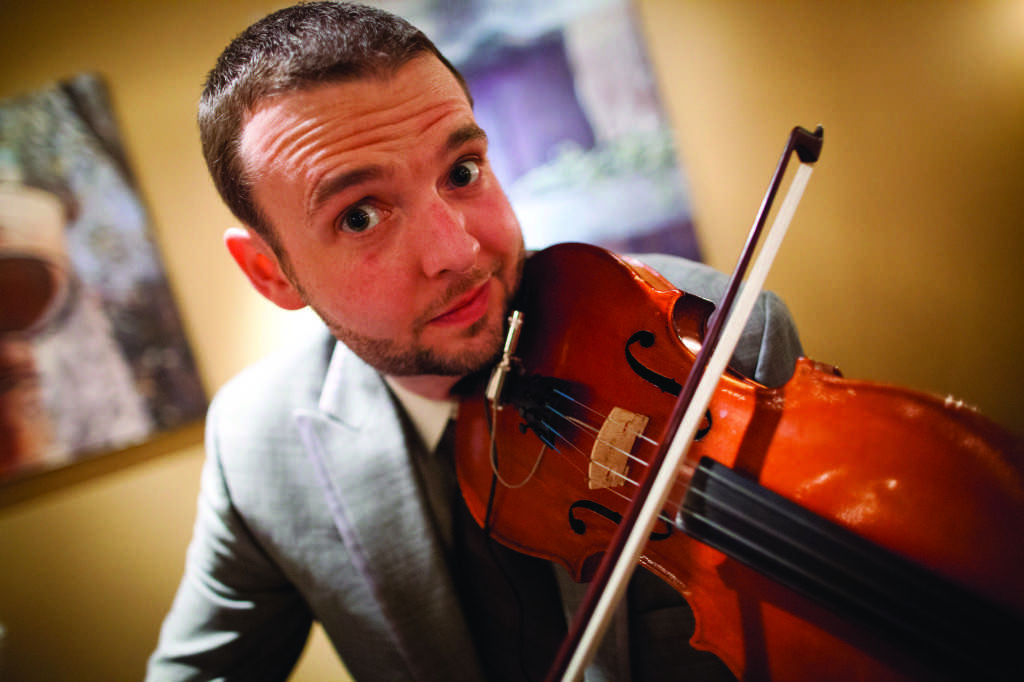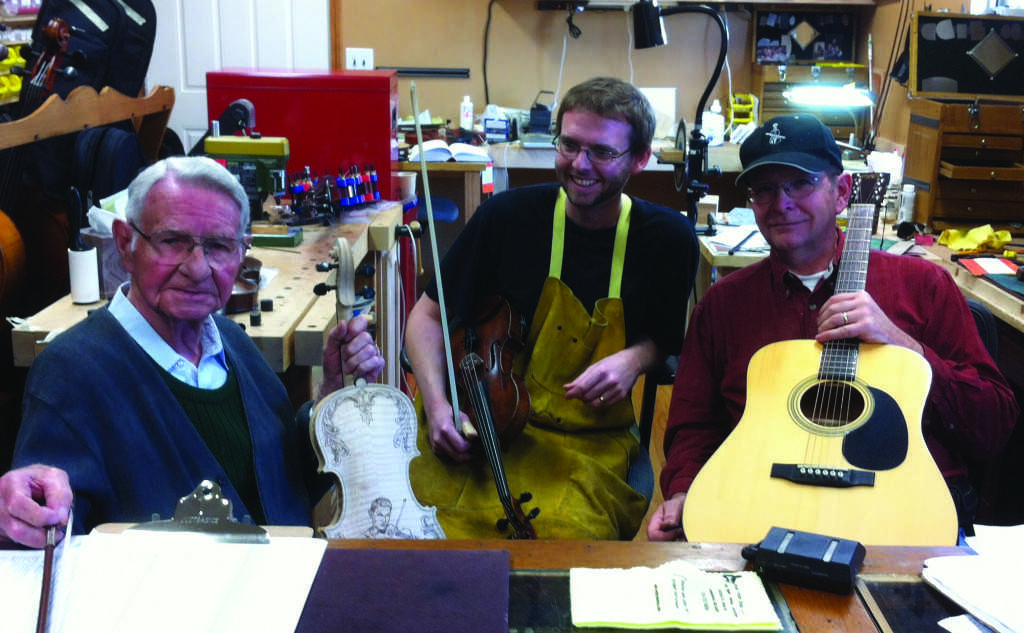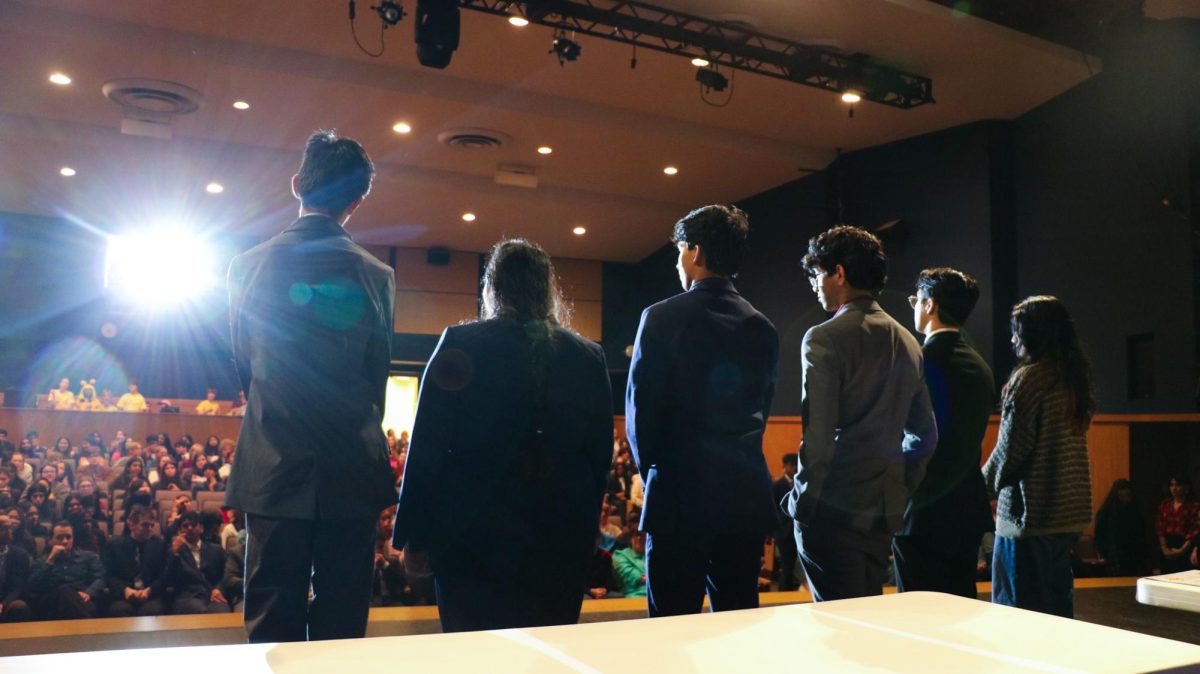
As a fourth generation fiddler, Matthew Wyatt, 34, has an occupation that cannot, in the most casual sense of the term, be described as normal; not many jobs dictate one’s lifestyle, and fewer still allow for constant travel across the country.
“I have a gig tonight,†Wyatt said after showing instruments to Clayton students at his Saint Louis appointment-only location. “[Afterwards] I’m going to Chicago because I have a really nice violin that I’m going out to consult with Jim Warren, a mentor and friend of mine who’s taught me an awful lot about the business.â€
Wyatt takes approximately four to six large trips to the East Coast each year from his family’s Kansas City violin shop.
“I go to New York quite a bit,†Wyatt said. “There’s a big auction house called Tarisio and I’ve gotten to know them quite well.â€
In addition to New York, Wyatt frequently travels to other locations throughout the nation.
“Often times I’ll stop along the way, I meet new contacts and it’s kind of a network that I’ve worked on building,†Wyatt said. “Networking is very important with this [business] because the violin world is about who you know, [and your contacts help you] in finding out how much to sell instruments and where to acquire them.â€
Some of the instruments he finds are taken back to his family’s Kansas City violin shop—where he works with his father, Allen Wyatt, during the time between trips—while other instruments end up in Wyatt’s personal collection or are sold to individuals. Matthew’s wife, Kristen Tourville, used to teach elementary strings at the Clayton School District before leaving last year, and she assists Wyatt and his father in the shop.
“What I’m doing is nothing new,†Wyatt said, “but I don’t know very many people who do exactly what I’m doing.â€
Although not at any rate new to the music world, Wyatt’s occupation does present to CHS students a side of a world obscured by the glory of performance.
With so many connections around the world, it is not surprising that Wyatt should have ties with the Clayton School District.
CHS orchestra teacher Julie Hoffman recalls pushing Wyatt into classical music to build up technique during her time as his orchestra teacher at Rockwood Summit High School. That lesson would be well appreciated years later during Wyatt’s time at Belmont University.
“He realized that [the technique building] actually helped him when he was in college,†Hoffman said, “I ran into him at a conference several years later and he said, ‘I just wanted you to know …’ and that was one of my happiest moments [as an educator].â€
Hoffman has utilized her link with Wyatt to benefit both Clayton and Wyatt’s business.
“Someone’s got to find [the instruments] first,†Hoffman said. “He’d come by and show me something that he had, and if I thought there was a student that looked like the instrument would fit what they were looking for, then I’d have them try it.â€
Wyatt’s childhood set the foundation for the passion he would come to pursue.
“[My childhood] was beautiful,†Wyatt said, “I grew up around a lot of music. My grandpa plays the fiddle so he would come up on Sundays. A lot of my friends were over 60, though I did have friends my age too.â€
The Wyatt family’s long time history with music would come to change Matthew’s life when his father began studying the making and repairing of instruments.
“My dad started making instruments about the same time I started playing, around 1991,†Wyatt said. “He got interested in violin repair. He was always into woodworking and he started learning from whomever he could and going to workshops.â€
Matthew’s own interest in repairs didn’t peak until his junior or senior year in high school when he began learning from his father in the workshop.
“Early on, I would get an instrument and wonder what the value was or ask myself questions like, is this German or is this French?†Wyatt said.
Wyatt’s remarkable curiosity lead him from one thing to the next, until he discovered an injustice to fuel his interest.
“I would take [the violins] to shops and different people I knew around. Price ranges could be all over the place of what the dealer would tell me the value was worth, and that just didn’t seem right to me,†Wyatt said.
During his studies at Belmont University in Nashville, TN, Wyatt encountered the same inconsistency in instrument pricing.
“It always bothered me. There should be a way that you come up with the real value [of an instrument],†Wyatt said.
Eventually, Wyatt moved back to Kansas City and started his family’s shop with his father in 2003.
During his stay at Nashville, Wyatt had also heard about the instrument auctions on the East Coast. He decided to branch out and connect with more people in the business.
“The biggest driving factor that interested me was trying to get to the bottom of things,†Wyatt said. “A dealer once said to me that a violin is worth what somebody will pay, and I thought that just seemed very wrong.â€
Wyatt met many people after he began going to musical instrument auctions, some of whom became his closest friends in the business. Learning from the experienced, Wyatt would listen at private hotel room meetings between his friends and big names in the business.
“For the first four or five years of doing this, I was just a fly on the wall listening to what happened. You learn a lot by seeing what they pay for things in the rooms,†Wyatt said.
Wyatt’s business dealings make very interesting stories. He recalled an amusing story involving an old, heavyset man and his trailer.
“This guy, I used to go visit him. He had this trailer that was just full of violins – three or four hundred, bows everywhere. I’d go over there, play him a couple of fiddle tunes and try to look for fiddles.†Wyatt said.
One day when the man came out of his trailer during a meeting with Wyatt, he dropped his keys, and they bounced and landed under his trailer.
Wyatt said, “I said, ‘[Mr. Johnson], I’ll go under there and get that key if you’ll let me in your house to see some of the instruments you keep in there.’ And he thought for a minute and said, ‘Okay, go get it.’ And he brought me inside [his house] and they were all the same kinds of stuff, but I just couldn’t help it because I wanted to know what he had!â€
When the man with the trailer passed away, his son contacted Wyatt trying to sell the violin collection. Wyatt ended up buying the entire 300-plus instrument collection.
“That’s just one example of the stuff I do all the time, but it can be a lot of work. We had to go in and lug them all in. You gotta love it to do that,†Wyatt said.
And it is undoubtedly obvious that Matthew Wyatt loves what he does. From collecting notes to taking pictures of all the unique instruments he encounters, Wyatt has amassed enough information in his database to take steps towards realizing his goal.
“I can go back and look at all of my John Friedrich violins that I’ve had in my hands and look at what they’ve sold for. And then, let’s say, somebody walks into the shop with a Friedrich and says, ‘What is this worth?’†Wyatt said. “You can come up with an actual value [of the instrument] that you can back up with data. So I feel very proud of beginning to accomplish what I set out for.â€
Despite his experience, Wyatt believes he still has a lot of learning to do.
“A friend commented one time that Charles Beare, a renowned expert in violins, may know two or three percent of what there is to know about violins family instruments, and that’s not very much!†Wyatt said, “So I don’t know where I fall, probably like .009 percent or something like that!â€
Along with Wyatt’s experiences, the family violin shop has grown dramatically since its 2003 establishment.
“Dad and I both do repairs. We do a lot of rentals and we’re pushing a thousand rentals in Kansas City, which is a lot, I think, in a few years to grow to,†Wyatt said. “We’ve met a lot of teachers and have just been very fortunate because we’re following what we love.â€
To young people in a world of many possibilities, the future may seem a hopeless mass of ambiguity. When asked for advice, Wyatt addresses CHS students with the following suggestion.
“I would tell them [to] follow their bliss,†Wyatt said, “Try different things, and see if you can find something that sparks an interest in you. As long as your actions are not affecting people negatively and you’re following the things you love, then I think you’ll be successful,†Wyatt said.





















